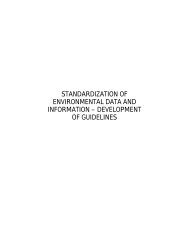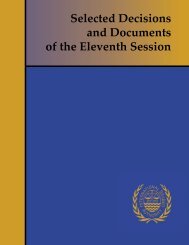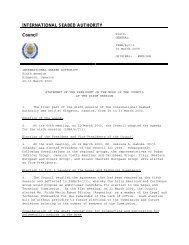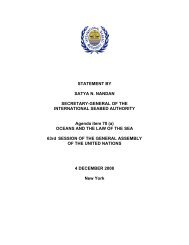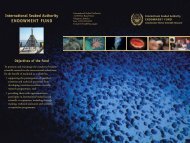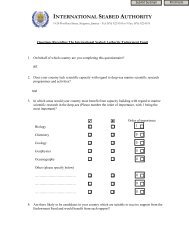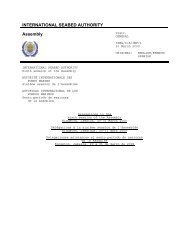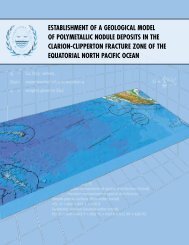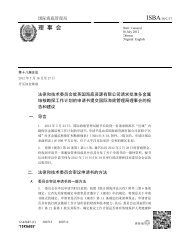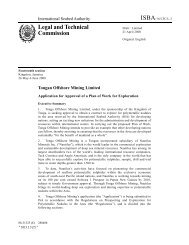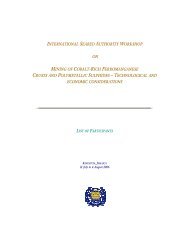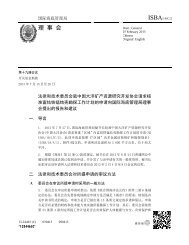Selected Decisions and Documents - International Seabed Authority
Selected Decisions and Documents - International Seabed Authority
Selected Decisions and Documents - International Seabed Authority
You also want an ePaper? Increase the reach of your titles
YUMPU automatically turns print PDFs into web optimized ePapers that Google loves.
According to the revised formulation shown in annex II, an overlapping application submitted within a period<br />
of 60 days of an earlier application would have the effect of suspending further action on both (or all)<br />
applications until such time as any conflicts between applicants could be resolved. Neither the Convention<br />
nor the Agreement provide for a mechanism for either the Legal <strong>and</strong> Technical Commission or the Council to<br />
make a choice between competing applications, 2 <strong>and</strong> for this reason it is suggested that no further action<br />
should be taken on any such application until all conflicts in respect of such applications are resolved.<br />
12. Competing applicants would be provided with an opportunity to resolve conflicts by negotiations.<br />
During this period, any such applicant may submit an amended claim.<br />
13. In the event that it is not possible to resolve overlapping claims, it would be necessary to refer the<br />
claims to an appropriate form of dispute settlement. Such a procedure was included in resolution II,<br />
paragraph 5, of which laid out a procedure for binding arbitration. Such arbitration was to be conducted in<br />
accordance with the United Nations Commission on <strong>International</strong> Trade Law (UNCITRAL) Arbitration Rules,<br />
taking into account a number of factors specified in paragraph 5(d) of resolution II. While this is a useful<br />
precedent, during preliminary discussion of this issue at the fourteenth session, some delegations had<br />
expressed the need to act in a manner consistent with article 188 of the Convention, while others had<br />
expressed doubts as to the current status of the UNCITRAL Arbitration Rules.<br />
14. The Arbitration Rules were adopted by UNCITRAL in 1976 after extensive consultation with arbitral<br />
institutions <strong>and</strong> arbitral experts. In the same year the General Assembly, in its resolution 31/98,<br />
recommended the use of the Arbitration Rules in the settlement of disputes arising in the context of<br />
international commercial relations. Since then, the Arbitration Rules have become well known <strong>and</strong> are widely<br />
referred to by contracting parties, whether States or other legal entities, in their arbitration clauses or<br />
agreements. As noted by some members of the Council during the fourteenth session, the Arbitration Rules<br />
are presently under review with a view to their modernization <strong>and</strong> to promote their greater efficiency.<br />
However, the m<strong>and</strong>ate given to the working group established to review the Arbitration Rules makes it clear<br />
that the guiding principle is that their original structure <strong>and</strong> spirit is to be maintained. According to the most<br />
recent report presented by UNCITRAL to the General Assembly, 3 it is intended that the final review <strong>and</strong><br />
adoption of any necessary revisions to the Arbitration Rules be done at the forty‐second session of UNCITRAL<br />
in 2009. Given this context, it is not expected that any revisions to the Arbitration Rules would have any<br />
substantial impact on their use in the context of the draft regulations. In any event, the Arbitration Rules that<br />
would be applicable to any such dispute would be the version in force at the time the dispute arises.<br />
15. Should members of the Council remain concerned about reference to the UNCITRAL Arbitration<br />
Rules, another possibility may be to make reference to the arbitration rules of the Permanent Court of<br />
Arbitration, in particular the Optional Rules for Arbitration of Disputes Relating to Natural Resources <strong>and</strong>/or<br />
the Environment. These Optional Rules, effective since 19 June 2001, are based on the UNCITRAL Arbitration<br />
Rules with appropriate modifications to reflect the particular characteristics of disputes having a natural<br />
resources, conservation or environmental component <strong>and</strong> also to reflect the public international law element<br />
which pertains to disputes which may involve States <strong>and</strong> the utilization of natural resources. Like the<br />
UNCITRAL Arbitration Rules, the Optional Rules are also available to States, international organizations <strong>and</strong><br />
private parties.<br />
__________________<br />
2<br />
The power of the Council to approve a recommendation relating to a plan of work for exploration is strictly limited by the 1994<br />
Agreement, Section 3, paragraphs 11 <strong>and</strong> 12. There is no procedure for the approval of part of a plan of work or for the resolution<br />
3<br />
of disputes by the Council.<br />
Official Records of the General Assembly, Sixty‐third Session, Supplement No. 17 (A/63/17).<br />
41



